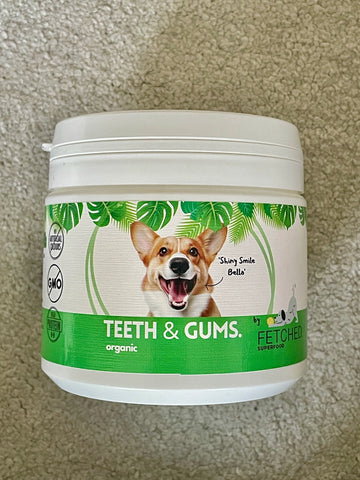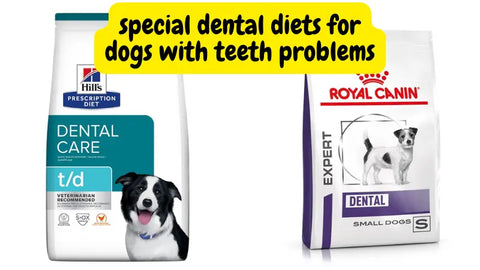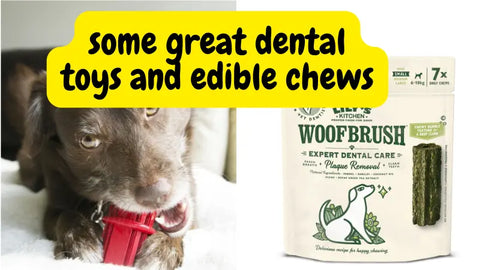Just like humans, dogs and cats can suffer from dental issues. Regular dental care is therefore vital for preventing discomfort and hefty vet bills, if you truly care for your pets. Our organic and 100% natural dental powder is one step you can take forward to protecting your dog's teeth.
Did you know that by the age of three, 80% of dogs experience some sort of dental problem?
This common issue progresses through various stages. Dental and gum problems usually start with the accumulation of plaque and tartar. If not treated, this leads to gingivitis.
Without proper care, this can further advance to periodontal disease, resulting in tooth loss and potentially severe infections that could even deeper structures like the bones or the sinuses.
Why is dental health in dogs so crucial?
Prevention is always the best way forward. But why is that? Let's take a look at 5 reasons why preventing oral disease is important to the wellbeing of dogs and cats.
1. Preventing Tooth loss: Regular dental hygiene helps maintain the teeth healthy and strong. If a dog looses one or more teeth, this could straight away start affecting its ability to chew and digest its food properly. Broken teeth are also more common in dogs who suffer from dental disease as the teeth get weakened over time. Dogs need strong and sharp teeth to ensure they can cut down the food into appropriate pieces for their size.
2. Alleviating pain: Diseases like gingivitis and periodontal disease are painful. The regular treatment needed for these once diagnosed can also be inconvenient and painful for your dog.
3. Eliminating bad breath: Plaque and tartar on the teeth are the biggest contributor to bad breath in dogs and cats. This is because bacteria can more easily build up if the teeth are not regularly cleaned. Over time, these start causing a foul smelling odour.
4. Protecting overall health: Dogs with periodontal disease are at a higher risk of developing organ failure, including issues with the heart, liver, and kidneys.
5. Cost savings: Dental problems are often not included in the standard pet insurance. Even if it is, having to claim because of broken teeth or gum problems will push up your premium. This is one avoidable way of ensuring you don't pay more than you have to.

Signs of dental disease in dogs
I see a lot of dogs with dental problems on a day to day basis. Here are some telltale signs to look out for:
- Persistent bad breath
- Difficulty eating or dropped food from the mouth
- Visible pain during mouth examinations
- Red, swollen, or bleeding gums
- Loose or missing teeth
- Decreased interest in chew toys
If you notice any of these, take your dog for a vet check straightaway. You might still have time to prevent further damage to your dog's teeth and gums.
Why don't animals in the wold have dental problems?
I often get asked this question as to why it's only domesticated dogs and cats that need their dental care.
Animals living in the wild do in fact experience dental problems. However, the prevalence and nature of these issues can be quite different from those seen in our pets. There are several reasons for this:
Natural Diet. No Processed Foods.
That's right, animals (and also humans) have evolved to be exposed to a natural diet. These include raw, tough materials that help clean their teeth as they chew. For instance, the process of gnawing on bones and tearing raw meat can help scrape plaque off their teeth, somewhat similar to how dental chews work for domestic dogs.
Beside when scavenging our bins, animals living iin the wild are also not exposed to processed foods. These are often softer, stickier, and have more added chemicals than raw foods. The sticky nature of these adheres to the teeth and contributes to faster plaque buildup. In contrast, the harder, fibrous foods in the wild help maintain dental health by mechanically cleaning the teeth.
Natural Evolution
It is also true that animals in the wild follow a survival of the fittest pathway. If you breath your teeth or get oral infections, you may not survive for long if this causes you any functional impairment.
They might be less able to eat and thus less likely to survive or reproduce. This natural selection means that chronic dental diseases are less observable in wild populations.
Genetic Factors
Whether you like it or not, pure breeds do tend to have more genetic predispositions to health problems than animals in the wild. This is due to the selective breeding practices that don't necessarily prioritise issues such as dental health.
Animals in the wild have adapted to their environment in ways that protect their own teeth and oral health. The ones that make it until later in life and manage to reproduce are the ones who are going to extend their genes.
What are my options for preventing dental disease in my dog?
I am so glad you've asked!
Prevention, prevention, prevention.
Proper Diet
In my opinion as a dog nutritionist, having a proper diet is the most important factor. I always advise my customers to give their dogs a combination of dry and wet food.
Wet food is of course less processed and has more nutrients than dry food, but dry kibble is essential as well.
The hard pieces from the kibble help reduce plaque buildup by scraping off the soft tartar deposits on the teeth. This is the equivalent to an animal in the wild eating meat off a bone.
Some dog food brands such as Royal Canin and Hill's also have dry kibble specific for dogs with dental problems. These foods are typically formulated with specific fiber alignments that help scrub the teeth as the dog chews.
Adding a powder supplement such as our own Teeth & Gums 100% organic and natural powder also helps reduce plaque and tartar in its own way. You can simply add this to your dog's daily wet or dry food.

Dental Hygiene Products
Dental chews and toys can work wonders. These products help maintain dental health by mechanically cleaning the teeth as your dog chews.
The occasional bone treat and other cartilage products help with the mechanical scraping of plaque off teeth as well. Other healthy dog treats, including dog biscuits can also help with teeth cleaning,

Old fashioned dental cleaning
If your dog has a significant build up of tartar and plaque already, then you might need to get this manually removed.
Veterinarians can perform professional teeth cleaning, removing heavy builds ups of plaque and tartar. This is the equivalent of us seeing a hygienist!
This may also be necessary if plaque has infiltrated below the gum line and is now causing irritation and tenderness around the teeth.
Prior to visiting a vet, you might want to try brushing your dog's teeth yourself, though this is more useful as a preventative measure.
Brushing your dog's teeth daily is the most effective way to remove plaque and prevent the buildup of tartar. Use a toothbrush designed for dogs and toothpaste that is safe for canine use, as human toothpaste can be toxic to dogs.
I hope my article has helped with emphasizing the importance of good oral health for your dog. Try to prevent teeth and gum disease, and your furry friend will thank you in the long run.









